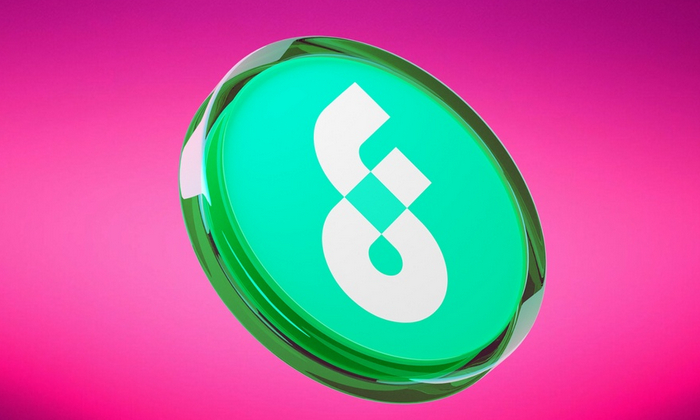-
 Bitcoin
Bitcoin $94,092.2703
-0.29% -
 Ethereum
Ethereum $1,799.1701
-0.39% -
 Tether USDt
Tether USDt $1.0003
-0.02% -
 XRP
XRP $2.2315
1.42% -
 BNB
BNB $601.0919
-1.03% -
 Solana
Solana $149.1813
-0.03% -
 USDC
USDC $1.0000
0.01% -
 Dogecoin
Dogecoin $0.1796
-1.12% -
 Cardano
Cardano $0.6979
-1.47% -
 TRON
TRON $0.2491
-1.02% -
 Sui
Sui $3.5910
3.48% -
 Chainlink
Chainlink $14.5359
-2.27% -
 Avalanche
Avalanche $21.7970
-0.90% -
 Stellar
Stellar $0.2830
-2.31% -
 UNUS SED LEO
UNUS SED LEO $9.0082
-0.81% -
 Toncoin
Toncoin $3.2314
-2.12% -
 Shiba Inu
Shiba Inu $0.0...01348
-5.09% -
 Hedera
Hedera $0.1871
-2.69% -
 Bitcoin Cash
Bitcoin Cash $351.4456
-2.28% -
 Litecoin
Litecoin $86.3202
-1.04% -
 Polkadot
Polkadot $4.0892
-4.60% -
 Hyperliquid
Hyperliquid $17.8780
0.04% -
 Dai
Dai $1.0001
0.00% -
 Bitget Token
Bitget Token $4.3692
-0.76% -
 Ethena USDe
Ethena USDe $0.9995
-0.01% -
 Pi
Pi $0.6305
-2.50% -
 Monero
Monero $228.7745
-0.04% -
 Pepe
Pepe $0.0...08790
-3.92% -
 Uniswap
Uniswap $5.5526
-4.49% -
 Aptos
Aptos $5.3721
-4.12%
Popular science: What kind of currency is FLOW coin? How to obtain FLOW coins?
FLOW coin, a permissioned Layer 1 blockchain cryptocurrency designed for high-throughput gaming and digital assets, provides fast transactions and enables the creation of NFTs, play-to-earn games, and staking opportunities.
Oct 31, 2024 at 01:04 pm

Popular Science: What is FLOW Coin and How to Obtain It
1. Understanding FLOW Coin
FLOW coin is the native cryptocurrency of the Flow blockchain. Flow is a permissioned Layer 1 blockchain designed for building and executing applications in games, digital assets, and other applications that require high throughput and low latency.
2. Key Features of FLOW Coin
- High Throughput: Flow can process thousands of transactions per second, enabling fast and efficient gaming and digital asset applications.
- Low Latency: Transactions on Flow are finalized in less than one second, providing a responsive and immersive experience.
- Upgradeable: Flow allows for rapid implementation of new features and enhancements without sacrificing network stability.
3. How to Obtain FLOW Coins
There are several ways to obtain FLOW coins:
- Buying on Crypto Exchanges: FLOW coins can be purchased on cryptocurrency exchanges such as OKX, Binance, and Huobi.
- Earning Through Play-to-Earn Games: Some games built on the Flow blockchain offer rewards in the form of FLOW coins for participating and completing tasks.
- Staking: FLOW coins can be staked to earn rewards for supporting the network.
- Purchasing NFTs: Non-fungible tokens (NFTs) built on the Flow blockchain can be purchased using FLOW coins.
4. Use Cases of FLOW Coin
FLOW coins are primarily used in the following ways:
- Transaction Fees: FLOW coins are used to pay for transactions on the Flow blockchain.
- Governance: FLOW coin holders have voting rights on the decisions that shape the Flow ecosystem.
- Staking: FLOW coins can be staked to participate in the network's security and earn rewards.
- Gaming: FLOW coins are the primary currency used in games built on the Flow blockchain.
- Digital Assets: NFTs and other digital assets on the Flow blockchain can be purchased and sold using FLOW coins.
5. Flow Blockchain's Partners and Projects
The Flow blockchain has partnerships with leading companies in gaming, such as Ubisoft, Warner Music Group, and Dapper Labs. Projects built on Flow include:
- NBA Top Shot: A platform for collecting and trading NBA player NFTs.
- Crypt0Ballers: A mobile game where players can collect, trade, and battle with fantasy basketball players.
- Warhammer 40,000: Warpforge: A card trading game set in the Warhammer 40,000 universe.
Disclaimer:info@kdj.com
The information provided is not trading advice. kdj.com does not assume any responsibility for any investments made based on the information provided in this article. Cryptocurrencies are highly volatile and it is highly recommended that you invest with caution after thorough research!
If you believe that the content used on this website infringes your copyright, please contact us immediately (info@kdj.com) and we will delete it promptly.
- If You Missed Solana's Explosive Breakout, There May Still Be Time to Catch the Next Big Opportunity—Lightchain AI
- 2025-04-28 01:20:13
- DungeonQuest
- 2025-04-28 01:20:13
- Bitcoin: the paradox of the discount and the voracious appetite of institutions
- 2025-04-28 01:15:12
- At $0.006695, Unstaked Could Outperform $0.2412 TRX and $0.57 ADA by 28x
- 2025-04-28 01:15:12
- Bitcoin (BTC) Price Cycle Theory Under Threat, Investors Could See The First Unique Cycle In Bitcoin's History
- 2025-04-28 01:10:13
- PEPE's 24% rally shows resilience. Despite a dip, the meme coin could break past $0.000010 in May. Is PEPE's growth momentum here to stay.
- 2025-04-28 01:10:13
Related knowledge

What is Ethereum’s Slashing mechanism and how to punish malicious behavior?
Feb 20,2025 at 03:08am
Key PointsOverview of slashingDifferent types of slashing in EthereumIncentives and consequences of slashingIdentifying and reporting slashed validatorsOngoing discussions and potential improvementsEthereum's Slashing Mechanism: Punishing Malicious BehaviorEthereum's slashing mechanism is an essential tool for ensuring network security and punishing mal...

What is the verifier node of Ethereum and how to become a verifier?
Feb 19,2025 at 06:00pm
The Verifier Node of Ethereum: A Comprehensive GuideKey Points:What is a Verifier Node?How to Become a Verifier NodeResponsibilities and Rewards of a Verifier NodeMinimum Requirements for Becoming a Verifier NodePotential Difficulties in Running a Verifier Node1. What is a Verifier Node?A Verifier Node is an independent entity on the Ethereum network th...

What is Ethereum’s staking, and how to participate and earn money?
Feb 19,2025 at 04:37pm
Key Points:Understanding Ethereum's Staking MechanismSteps to Participate in StakingBenefits and Rewards of StakingSecurity and Risk ConsiderationsTechnical Requirements and Hardware OptionsPotential Challenges and Troubleshooting TipsFAQs on Ethereum StakingWhat is Ethereum's Staking?Proof-of-Stake (PoS) is a consensus mechanism used in blockchain netw...

What is Ethereum’s DAO (Decentralized Autonomous Organization) and how does it work?
Feb 20,2025 at 03:12am
Key PointsDefinition and Structure of a DAOGovernance and Decision-Making in DAOsBenefits and Use Cases of DAOsChallenges and Limitations of DAOsWhat is Ethereum's DAO (Decentralized Autonomous Organization) and How Does It Work?Definition and Structure of a DAOA Decentralized Autonomous Organization (DAO) is an innovative governance and management fram...

What is Ethereum's multi-signature wallet and how to improve security?
Feb 20,2025 at 02:18pm
Key Points:Understanding the Concept of a Multi-Signature WalletBenefits and Drawbacks of Multisig WalletsRequirements for Setting Up a Multisig WalletStep-by-Step Guide to Generating a Multisig WalletImplementing Strategies for Enhanced Security1. Understanding the Concept of a Multi-Signature WalletA multi-signature (multisig) wallet in the Ethereum e...

What is Ethereum's oracle and how to provide data for smart contracts?
Feb 21,2025 at 01:30am
Key Points:Understanding the concept of oracles in EthereumExploring different types of oraclesDetailed guide on how to provide data for smart contractsAddressing potential challenges and considerationsWhat is Ethereum's Oracle?Oracles are crucial components in the Ethereum ecosystem, enabling smart contracts to access real-world data and off-chain even...

What is Ethereum’s Slashing mechanism and how to punish malicious behavior?
Feb 20,2025 at 03:08am
Key PointsOverview of slashingDifferent types of slashing in EthereumIncentives and consequences of slashingIdentifying and reporting slashed validatorsOngoing discussions and potential improvementsEthereum's Slashing Mechanism: Punishing Malicious BehaviorEthereum's slashing mechanism is an essential tool for ensuring network security and punishing mal...

What is the verifier node of Ethereum and how to become a verifier?
Feb 19,2025 at 06:00pm
The Verifier Node of Ethereum: A Comprehensive GuideKey Points:What is a Verifier Node?How to Become a Verifier NodeResponsibilities and Rewards of a Verifier NodeMinimum Requirements for Becoming a Verifier NodePotential Difficulties in Running a Verifier Node1. What is a Verifier Node?A Verifier Node is an independent entity on the Ethereum network th...

What is Ethereum’s staking, and how to participate and earn money?
Feb 19,2025 at 04:37pm
Key Points:Understanding Ethereum's Staking MechanismSteps to Participate in StakingBenefits and Rewards of StakingSecurity and Risk ConsiderationsTechnical Requirements and Hardware OptionsPotential Challenges and Troubleshooting TipsFAQs on Ethereum StakingWhat is Ethereum's Staking?Proof-of-Stake (PoS) is a consensus mechanism used in blockchain netw...

What is Ethereum’s DAO (Decentralized Autonomous Organization) and how does it work?
Feb 20,2025 at 03:12am
Key PointsDefinition and Structure of a DAOGovernance and Decision-Making in DAOsBenefits and Use Cases of DAOsChallenges and Limitations of DAOsWhat is Ethereum's DAO (Decentralized Autonomous Organization) and How Does It Work?Definition and Structure of a DAOA Decentralized Autonomous Organization (DAO) is an innovative governance and management fram...

What is Ethereum's multi-signature wallet and how to improve security?
Feb 20,2025 at 02:18pm
Key Points:Understanding the Concept of a Multi-Signature WalletBenefits and Drawbacks of Multisig WalletsRequirements for Setting Up a Multisig WalletStep-by-Step Guide to Generating a Multisig WalletImplementing Strategies for Enhanced Security1. Understanding the Concept of a Multi-Signature WalletA multi-signature (multisig) wallet in the Ethereum e...

What is Ethereum's oracle and how to provide data for smart contracts?
Feb 21,2025 at 01:30am
Key Points:Understanding the concept of oracles in EthereumExploring different types of oraclesDetailed guide on how to provide data for smart contractsAddressing potential challenges and considerationsWhat is Ethereum's Oracle?Oracles are crucial components in the Ethereum ecosystem, enabling smart contracts to access real-world data and off-chain even...
See all articles























































































